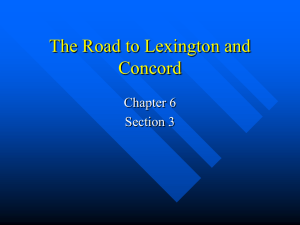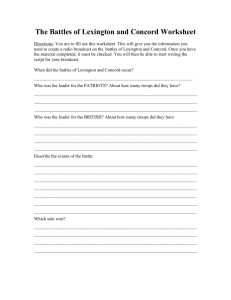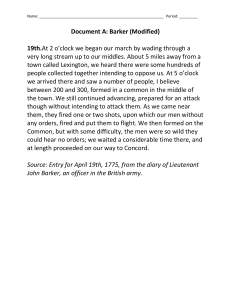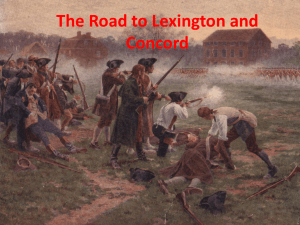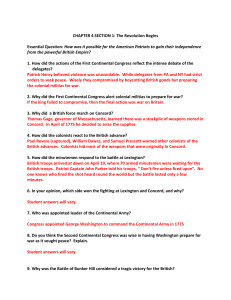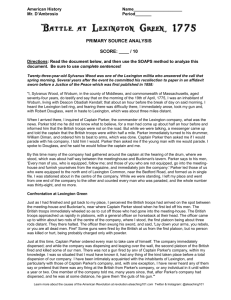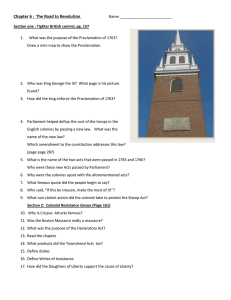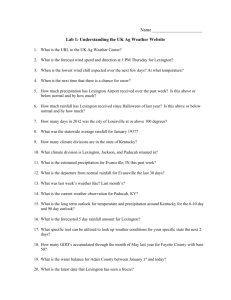Source C: “Battle at Lexington Green, 1775”, Eyewitness to History
advertisement
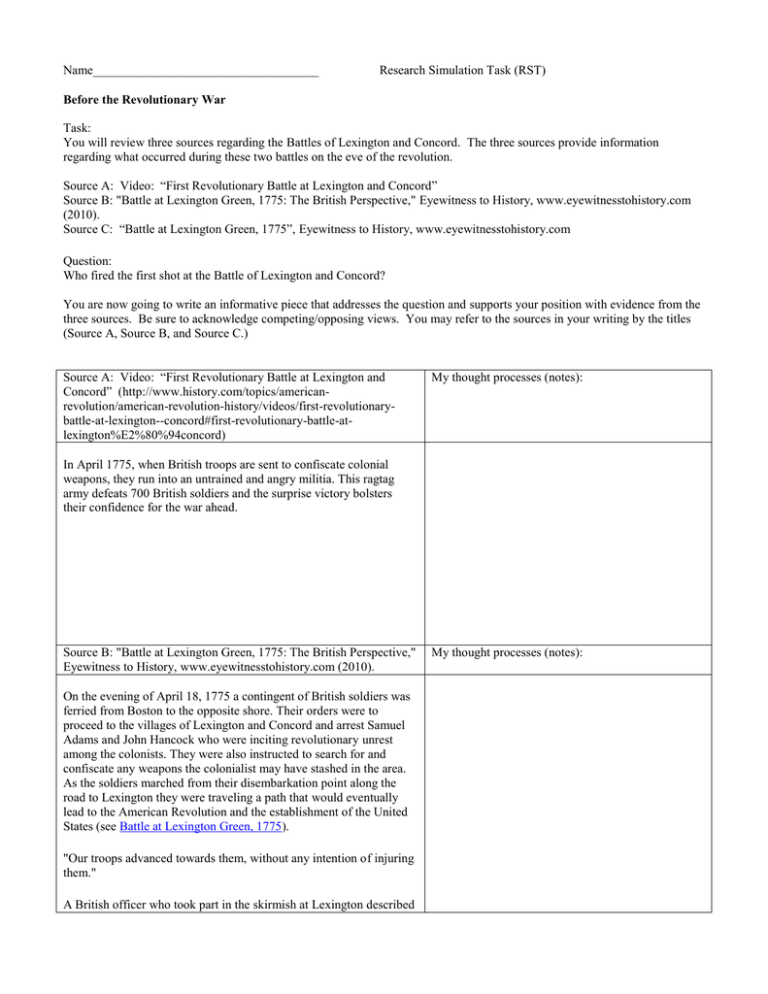
Name____________________________________ Research Simulation Task (RST) Before the Revolutionary War Task: You will review three sources regarding the Battles of Lexington and Concord. The three sources provide information regarding what occurred during these two battles on the eve of the revolution. Source A: Video: “First Revolutionary Battle at Lexington and Concord” Source B: "Battle at Lexington Green, 1775: The British Perspective," Eyewitness to History, www.eyewitnesstohistory.com (2010). Source C: “Battle at Lexington Green, 1775”, Eyewitness to History, www.eyewitnesstohistory.com Question: Who fired the first shot at the Battle of Lexington and Concord? You are now going to write an informative piece that addresses the question and supports your position with evidence from the three sources. Be sure to acknowledge competing/opposing views. You may refer to the sources in your writing by the titles (Source A, Source B, and Source C.) Source A: Video: “First Revolutionary Battle at Lexington and Concord” (http://www.history.com/topics/americanrevolution/american-revolution-history/videos/first-revolutionarybattle-at-lexington--concord#first-revolutionary-battle-atlexington%E2%80%94concord) My thought processes (notes): In April 1775, when British troops are sent to confiscate colonial weapons, they run into an untrained and angry militia. This ragtag army defeats 700 British soldiers and the surprise victory bolsters their confidence for the war ahead. Source B: "Battle at Lexington Green, 1775: The British Perspective," Eyewitness to History, www.eyewitnesstohistory.com (2010). On the evening of April 18, 1775 a contingent of British soldiers was ferried from Boston to the opposite shore. Their orders were to proceed to the villages of Lexington and Concord and arrest Samuel Adams and John Hancock who were inciting revolutionary unrest among the colonists. They were also instructed to search for and confiscate any weapons the colonialist may have stashed in the area. As the soldiers marched from their disembarkation point along the road to Lexington they were traveling a path that would eventually lead to the American Revolution and the establishment of the United States (see Battle at Lexington Green, 1775). "Our troops advanced towards them, without any intention of injuring them." A British officer who took part in the skirmish at Lexington described My thought processes (notes): the event in a letter to the Massachusetts Governor shortly after: "Lieut. Col. Smith to Governor Gage Boston, April 22, 1775. Sir, In obedience to your Excellency's commands, I marched on the evening of the 18th inst. with the corps of grenadiers and light infantry for Concord, to execute your Excellency's orders with respect to destroying all ammunition, artillery, tents, &c., collected there, which was effected, having knocked off the trunnions of three pieces of iron ordnance, some new gun carriages, a great number of carriage wheels burnt, a considerable quantity of flour, some gunpowder and musket balls, with other small articles thrown into the river. Notwithstanding we marched with the utmost expedition and secrecy, we found the country had intelligence or strong suspicion of our coming, and fired many signal guns, and rung the alarm bells repeatedly; and were informed, when at Concord, that some cannon had been taken out of the town that day, that others, with some stores, had been carried three days before. . . . I think it proper to observe, that when I had got some miles on the march from Boston, I detached six light infantry companies to march with all expedition to seize the two bridges on different roads beyond Concord. On these companies' arrival at Lexington, I understand, from the report of Major Pitcairn, who was with them, and from many officers, that they found on a green close to the road a body of the country people drawn up in military order, with arms and accoutrements, and, as appeared after, loaded; and that they had posted some men in a dwelling and Meeting-house. Our troops advanced towards them, without any intention of injuring them, further than to inquire the reason of their being thus assembled, and, if not satisfactory, to have secured their arms; but they in confusion went off, principally to the left, only one of them fired before he went off, and three or four more jumped over a wall and fired from behind it among the soldiers; on which the troops returned it, and killed several of them. They likewise fired on the soldiers from the Meeting and dwellinghouse. We had one man wounded, and Major Pitcairn's horse shot in two places. Rather earlier than this, on the road, a country man from behind a wall had snapped his piece at Lieutenants Adair and Sutherland, but it flashed and did not go off. After this we saw some in the woods, but marched on to Concord without anything further happening. While at Concord we saw vast numbers assembling in many parts; at one of the bridges they marched down, with a very considerable body, on the light infantry posted there. On their coming pretty near, one of our men fired on them, which they returned; on which an action ensued, and some few were killed and wounded. In this affair, it appears that after the bridge was quitted, they scalped and otherwise ill-treated one or two of the men who were either killed or severely wounded, being seen by a party that marched by soon after. At Concord we found very few inhabitants in the town; those we met with both Major Pitcairn and myself took all possible pains to convince that we meant them no injury, and that if they opened their doors when required to search for military stores, not the slightest mischief would be done. We had opportunities of convincing them of our good intentions, but they were sulky; and one of them even struck Major Pitcairn. On our leaving Concord to return to Boston, they began to fire on us from behind the walls, ditches, trees, etc., which, as we marched, increased to a very great degree, and continued without the intermission of five minutes altogether, for, I believe, upwards of eighteen miles; so that I can't think but it must have been a preconcerted scheme in them, to attack the King's troops the first favorable opportunity that offered, otherwise, I think they could not, in so short a time as from our marching out, have raised such a numerous body, and for so great a space of ground. Notwithstanding the enemy's numbers, they did not make one gallant effort during so long an action, though our men were so very much fatigued, but kept under cover. I have the honor, etc. F. Smith, Lt-Col. 10th Foot." Source C: Battle at Lexington Green, 1775, Battle at Lexington Green, 1775," Eyewitness to History, www.eyewitnesstohistory.com (2001 Massachusetts Colony was a hotbed of sedition in the spring of 1775. Preparations for conflict with the Royal authority had been underway throughout the winter with the production of arms and munitions, the training of militia (including the minutemen), and the organization of defenses. In April, General Thomas Gage, military governor of Massachusetts decided to counter these moves by sending a force out of Boston to confiscate weapons stored in the village of Concord and capture patriot leaders Samuel Adams and John Hancock reported to be staying in the village of Lexington. The atmosphere was tense, word of General Gage's intentions spread through Boston prompting the patriots to set up a messaging system to alert the countryside of any advance of British troops. Paul Revere arranged for a signal to be sent by lantern from the steeple of North Church - one if by land, two if by sea. On the night of April 18, 1775 the lantern's alarm sent Revere, William Dawes and other riders on the road to spread the news. The messengers cried out the alarm, awakening every house, warning of the British column making its way towards Lexington. In the rider's wake there erupted the peeling of church bells, the beating of drums and the roar of gun shots - all announcing the danger and calling the local militias to action. In the predawn light of April 19, the beating drums and peeling bells summoned between 50 and 70 militiamen to the town green at Lexington. As they lined up in battle formation the distant sound of marching feet and shouted orders alerted them of the Redcoats' approach. Soon the British column emerged through the morning fog and the confrontation that would launch a nation began. "Lay down your arms, you damned rebels." Twenty-three-year-old Sylvanus Wood was one of the Lexington militia who answered the call that spring morning. Several years after My thought processes (notes): the event he committed his recollection to paper in an affidavit sworn before a Justice of the Peace which was first published in 1858: "I, Sylvanus Wood, of Woburn, in the county of Middlesex, and commonwealth of Massachusetts, aged seventy-four years, do testify and say that on the morning of the 19th of April, 1775, I was an inhabitant of Woburn, living with Deacon Obadiah Kendall; that about an hour before the break of day on said morning, I heard the Lexington bell ring, and fearing there was difficulty there, I immediately arose, took my gun and, with Robert Douglass, went in haste to Lexington, which was about three miles distant. When I arrived there, I inquired of Captain Parker, the commander of the Lexington company, what was the news. Parker told me he did not know what to believe, for a man had come up about half an hour before and informed him that the British troops were not on the road. But while we were talking, a messenger came up and told the captain that the British troops were within half a mile. Parker immediately turned to his drummer, William Diman, and ordered him to beat to arms, which was done. Captain Parker then asked me if I would parade with his company. I told him I would. Parker then asked me if the young man with me would parade. I spoke to Douglass, and he said he would follow the captain and me. By this time many of the company had gathered around the captain at the hearing of the drum, where we stood, which was about half way between the meetinghouse and Buckman's tavern. Parker says to his men, 'Every man of you, who is equipped, follow me; and those of you who are not equipped, go into the meeting-house and furnish yourselves from the magazine, and immediately join the company.' Parker led those of us who were equipped to the north end of Lexington Common, near the Bedford Road, and formed us in single file. I was stationed about in the centre of the company. While we were standing, I left my place and went from one end of the company to the other and counted every man who was paraded, and the whole number was thirty-eight, and no more. Just as I had finished and got back to my place, I perceived the British troops had arrived on the spot between the meeting-house and Bucknian's, near where Captain Parker stood when he first led off his men. The British troops immediately wheeled so as to cut off those who had gone into the meeting-house. The British troops approached us rapidly in platoons, with a general officer on horseback at their head. The officer came up to within about two rods of the centre of the company, where I stood, the first platoon being about three rods distant. They there halted. The officer then swung his sword, and said, "Lay down your arms, you damned rebels, or you are all dead men. Fire!" Some guns were fired by the British at us from the first platoon, but no person was killed or hurt, being probably charged only with powder. Just at this time, Captain Parker ordered every man to take care of himself. The company immediately dispersed; and while the company was dispersing and leaping over the wall, the second platoon of the British fired and killed some of our men. There was not a gun fired by anv of Captain Parker's company, within my knowledge. I was so situated that I must have known it, had any thing of the kind taken place before a total dispersion of our company. I have been intimately acquainted with the inhabitants of Lexington, and particularly with those of Captain Parker's company, and, with one exception, I have never heard any of them say or pretend that there was any firing at the British from Parker's company, or any individual in it until within a year or two. One member of the company told me, many years since, that, after Parker's company had dispersed, and he was at some distance, he gave them 'the guts of his gun.'" RST Graphic Organizer--Prewriting Topic: Thesis Statement: Source A Exactly how do the sources talk to each other? Your outline: Source B Source C RST Scoring Checklist Development of Ideas ❏ Did the author use evidence from the text? ❏ Did this evidence come from more than one source? ❏ Did the author successfully have two sources interact with each other? Organization ❏ Is there a clearly expressed introduction, body, and conclusion? ❏ Does the introduction have an attention-grabber and a clearly stated thesis? ❏ Do each of the body paragraphs support the thesis? ❏ Does the conclusion successfully answer the So What? Question? Written Expression ❏ Does the author effectively use vocabulary, including content-specific words? ❏ Does the author utilize vivid and proper description? ❏ Does the author appropriately use transitional words throughout the piece? ❏ Is the style clear, concise, and to the point? ❏ Are any points in the essay ambiguous and unclear? Knowledge of Language Conventions ❏ Were there any mistakes in grammar, mechanics, and usage? ❏ Did the author go back and edit the work? ❏ Does the work read effortlessly? ❏ Does poor grammar become a distraction or a nuisance?
